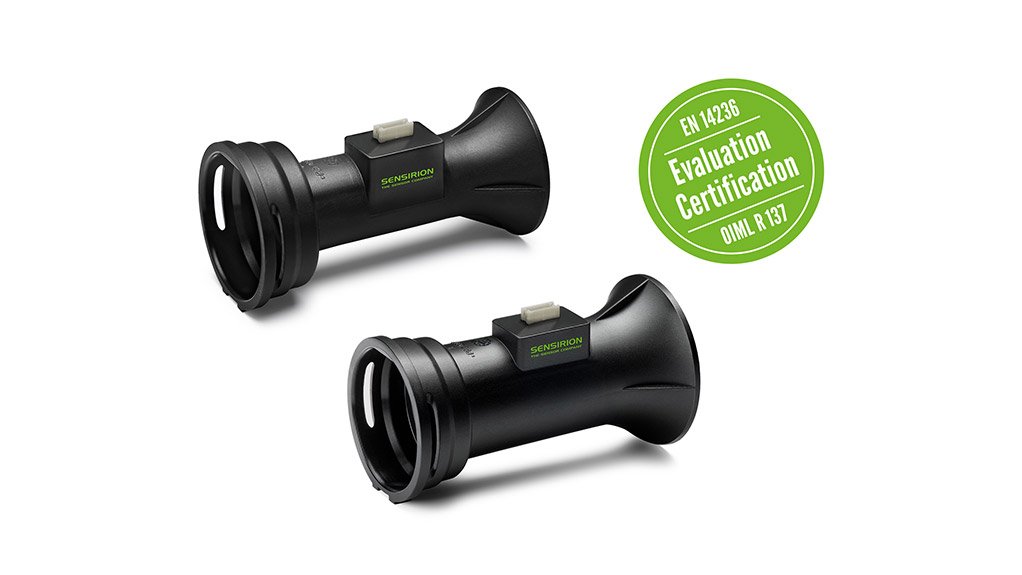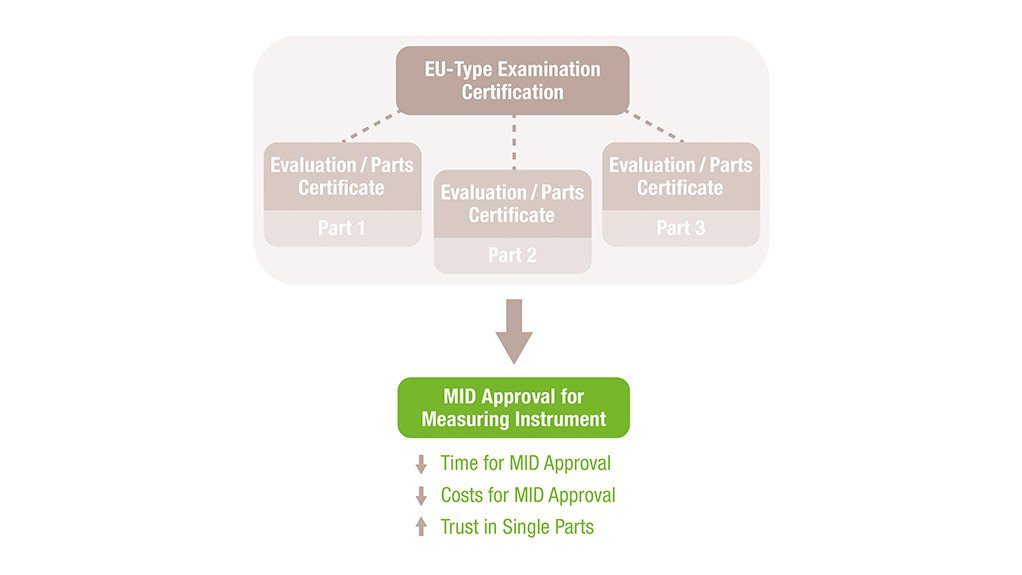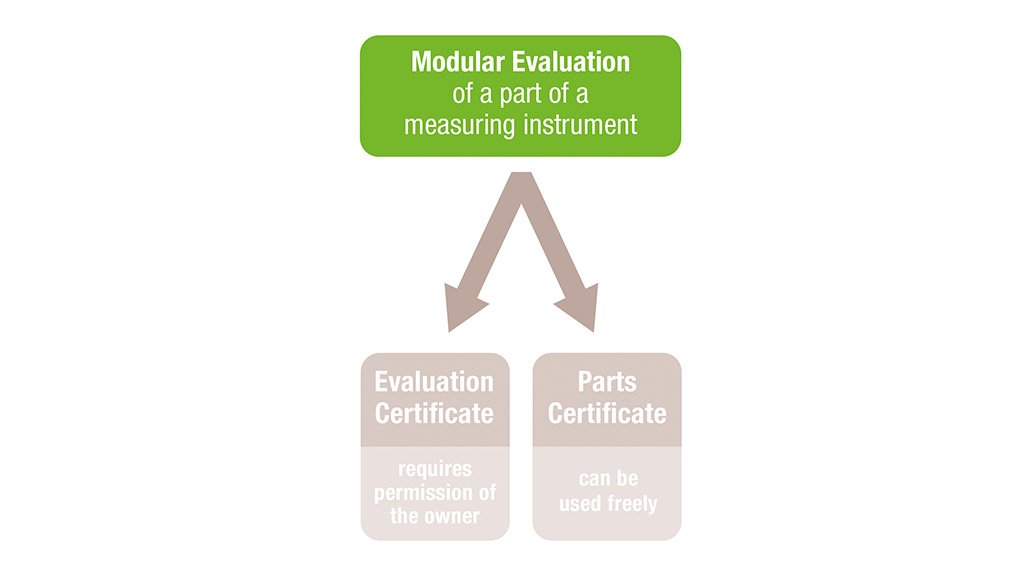An Efficient Approach to Obtain an MID Approval for Measuring Instruments
This article has been supplied as a media statement and is not written by Creamer Media. It may be available only for a limited time on this website.
For manufacturers, the time to market for their measuring instruments can be crucial, particularly during massive and time-limited roll-out programs, as are currently taking place for smart meters in several European countries. Typically, a considerable fraction of the time to market for measuring instruments is taken up by the MID approval process. A modular evaluation approach, based on the employment of Evaluation and Parts Certificates for single parts, has great potential in efficient, cost-saving MID approval of complete measuring instruments.
Measuring Instrument Directives
In Europe the legal basis for measuring instruments is set in the Measuring Instrument Directives (MID) of the European Parliament, dating from February 2014. The MID covers the whole approval process, initial verification and putting into use of 10 different types of measuring instruments; for instance, electricity, gas, heat and water meters. Before a measuring instrument is brought to the European market, its compliance with the MID must be verified by a Notified Body in an extensive approval procedure.
Modular Evaluation Approach
The MID describes the legal approval of complete measuring instruments. However, in practice most of today’s measuring instruments consist of several individual parts from different producers. This has led to the need for a modular evaluation approach of single parts that will allow efficient MID approval of complete measuring instruments.
WELMEC (Western European Legal Metrology Cooperation), which aims to establish a harmonized and consistent approach to European legal metrology, has recognized the necessity of such a modular evaluation approach. One of its working groups has established the WELMEC Guide 8.8, which describes the approval of individual parts that perform a defined function inside complete measuring instruments. A part evaluation results in either an Evaluation Certificate (EC) or a Parts Certificate (PC). In fact, both documents are identical, except that a PC and the corresponding technical documentation can be used freely, whereas the use of an EC requires the permission of the owner.
Figure 1: Part evaluation results in either an Evaluation Certificate (EC) or a Parts Certificate (PC).
Benefits for All Players
If a part has an EC or PC, it means that the essential requirements of the MID for this particular part are fulfilled. ECs and PCs of built-in parts can be used during evaluation of a complete measuring instrument. Only those aspects not covered by the EC or PC must be evaluated in order to obtain MID approval of the complete measuring instrument.
The modular approval procedure offers many benefits for all players involved: in particular, savings in costs and time, since certain aspects of the MID, already covered by ECs and PCs of single parts, do not need to be repeated for the complete measuring instrument. In addition, it assures manufacturers that they are using a certified MID-compliant part in their device.
Figure 2: Modular evaluation approach offers benefits for all parties involved: saving of time and costs and increased trust in single parts.
Example: Evaluation Certificate for Gas Meter Modules
Sensirion has achieved an EC for its SGM70xx gas meter modules in accordance with the harmonized standard EN14236 and the normative document OIML R 137 for natural gas types H and L. The EC was issued by NMi, one of the leading Notified Bodies in Europe for type approval examination and certification of measuring instruments. The EC covers all metrological aspects of the MID for a microthermal gas meter. The EC enables easier MID approval for gas meter manufacturers that use the SGM70xx microthermal sensor module as the core metrological unit. The costs and time required for MID approval of complete gas meters are reduced significantly, which can result in valuable short time to market.
Figure 3: Sensirion’s SGM70xx have achieved an Evaluation Certificate according to EN14236 and OIML R137 for H and L gas.
Summary
The modular evaluation approach, described in WELMEC guide 8.8, has great potential for efficient MID approval of complete measuring instruments. It can help to save costs and time since certain aspects of the MID, already covered by ECs and PCs of single parts, do not need to be repeated for the complete measuring instrument. Furthermore, it assures manufacturers that they are using a certified MID-compliant part in their device.
Interview with Henri Schouten, Senior Approvals Expert at NMi
How long has the modular approach been used by NMi?
NMi had invented the modular system before the MID was implemented; that is, before 2006 when the national legal systems were still in place in Europe. After the introduction of the MID, NMi encouraged the use of the modular approach, in conformance with the system laid down in WELMEC 8.8. I can honestly say that NMi is the Notified Body in Europe that issues the most Evaluation Certificates, but other European Notified Bodies also make use of the modular evaluation approach. It has become increasingly popular.
Can every Notified Body issue an Evaluation or Parts certificate?
In principle, yes, since an Evaluation or Parts certificate is not a legal document as such. However, once it is implemented in an EU-type examination certificate – in an MID approval – then it becomes legal. The modular approval is a voluntary system based on a gentleman’s agreement among Notified Bodies. They can make use of Evaluation or Parts certificates to issue EU-type examination certificates for complete measuring instruments. Notified Bodies also have an agreement that they will accept only Evaluation and Parts certificates issued by Notified Bodies that also act as a Notified Body for a particular complete measuring instrument.
What challenges have you experienced with the modular approach?
We deal with parts producers that are sometimes not used to legal metrology. The moment they enter this world, more explanations are needed than if we collaborate with, for instance, meter manufacturers that typically are well aware of the legal aspects. Overall, the modular approach opens a lot of doors to new certifications and new connections between producers and manufacturers that can help to simplify collaboration. So, in our experience, the advantages of the modular evaluation approach clearly outnumber the challenges.
Is the modular approach the future trend?
Yes, in my opinion the modular approach is really the future in several areas. Of course, there will always remain manufacturers of the total measuring instrument. In some areas, the modular approach does not have quite so many advantages – such as in the world of electricity meters. However, in the field of gas and volume conversion devices, it has a lot of advantages. This area has many different producers in various sectors; for instance, mechanics and electronics. And for gas meters, where we see gas meter measuring parts, indicator parts and pressure and temperature sensors, the modular evaluation approach is really interesting for all players involved.
About Sensirion
Sensirion is a leading manufacturer of high quality sensors and sensor solutions for the measurement and control of gas and liquid flows, humidity and temperature. Sensirion is an expert and innovative pioneer in microthermal gas metering, and its microthermal modules have been a large-scale success in Europe. More than 500,000 Sensirion gas meter modules provide reliable and real-time monitoring of gas consumption in Europe. Founded in 1998, the company is based in Staefa near Zurich, Switzerland, and employs people in the US, South Korea, Japan, China, Taiwan and Germany. The headquarters in Switzerland is responsible for research, development and production.
Millions of Sensirion's sensor components and solutions are used all over the world, including in the smart energy, building technology, automotive and medical technology sectors. Sensirion's success is based on the innovative CMOSens® Technology, which combines sensor and analysis electronics in a single semiconductor chip. Thus, large unit numbers can be produced at high quality and low cost.
Comments
Announcements
What's On
Subscribe to improve your user experience...
Option 1 (equivalent of R125 a month):
Receive a weekly copy of Creamer Media's Engineering News & Mining Weekly magazine
(print copy for those in South Africa and e-magazine for those outside of South Africa)
Receive daily email newsletters
Access to full search results
Access archive of magazine back copies
Access to Projects in Progress
Access to ONE Research Report of your choice in PDF format
Option 2 (equivalent of R375 a month):
All benefits from Option 1
PLUS
Access to Creamer Media's Research Channel Africa for ALL Research Reports, in PDF format, on various industrial and mining sectors
including Electricity; Water; Energy Transition; Hydrogen; Roads, Rail and Ports; Coal; Gold; Platinum; Battery Metals; etc.
Already a subscriber?
Forgotten your password?
Receive weekly copy of Creamer Media's Engineering News & Mining Weekly magazine (print copy for those in South Africa and e-magazine for those outside of South Africa)
➕
Recieve daily email newsletters
➕
Access to full search results
➕
Access archive of magazine back copies
➕
Access to Projects in Progress
➕
Access to ONE Research Report of your choice in PDF format
RESEARCH CHANNEL AFRICA
R4500 (equivalent of R375 a month)
SUBSCRIBEAll benefits from Option 1
➕
Access to Creamer Media's Research Channel Africa for ALL Research Reports on various industrial and mining sectors, in PDF format, including on:
Electricity
➕
Water
➕
Energy Transition
➕
Hydrogen
➕
Roads, Rail and Ports
➕
Coal
➕
Gold
➕
Platinum
➕
Battery Metals
➕
etc.
Receive all benefits from Option 1 or Option 2 delivered to numerous people at your company
➕
Multiple User names and Passwords for simultaneous log-ins
➕
Intranet integration access to all in your organisation



























